In British slang, 'nutter' refers to someone perceived as eccentric or crazy, a term deeply embedded within the fabric of British culture. Historically, stemming from "nut" as in the hard fruit of a tree, it has evolved to connote both eccentricity and endearment, capturing the dynamic between language and societal attitudes towards individuality and mental health. Across the UK, its use varies; affectionately in Northern England, unpredictably in Scotland, and to denote uniqueness in London and the South East, underscoring the diversity of British dialects. Cultural implications reveal how 'nutter' balances affection, individualism, and social conformity, a reflection without a direct American English counterpart. Unpacking its nuances offers a fuller understanding of its place within British linguistic and social landscapes.
Key Takeaways
- 'Nutter' is British slang for someone perceived as crazy or eccentric.
- It carries both affectionate and humorous undertones, depending on context.
- The term originates from 'nut' in Old English, symbolizing eccentricity.
- Usage and interpretation can vary significantly across different regions of the UK.
- It reflects broader British cultural attitudes towards individuality and mental health.
Definition and Usage
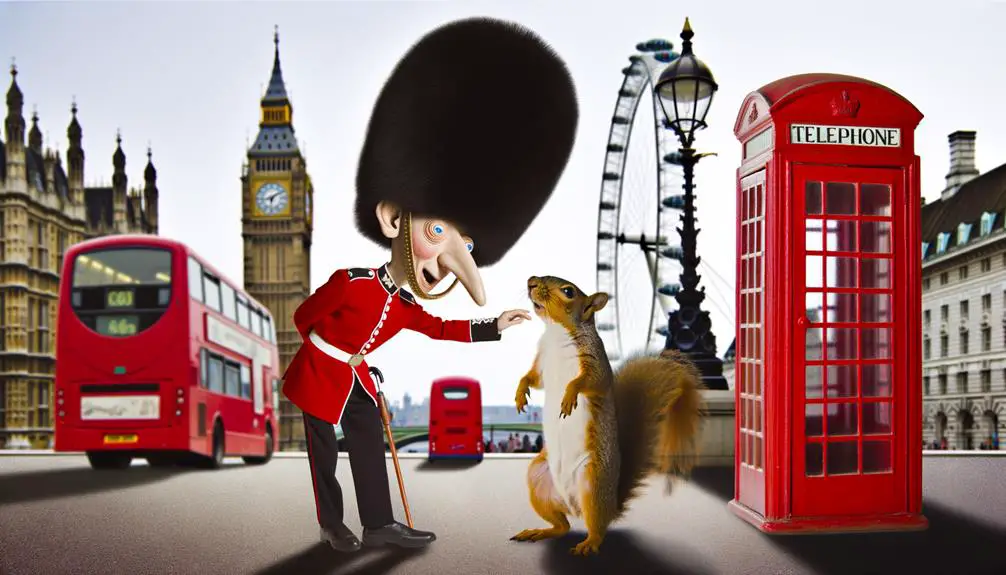
In the domain of British slang, 'nutter' refers to an individual who's considered to be crazy or eccentric, embodying a term that, when used, conveys a nuanced understanding of social behaviors and mental states. This expression, deeply entrenched in the vernacular, bridges a gap between colloquial language and the complex fabric of British culture. It's paramount to dissect the term 'nutter' beyond its surface-level connotations, especially when addressing common misconceptions that frequently accompany its usage.
A predominant misconception is the blanket application of 'nutter' to anyone displaying slightly unconventional behavior, without appreciating the term's depth and the cultural context from which it arises. It's not merely a label for the mentally ill; rather, it's often used affectionately or humorously to describe someone who's harmlessly eccentric or behaves in a way that deviates from the norm. This dual nature underscores the importance of context in interpreting its meaning accurately.
International comparisons yield fascinating insights into how similar expressions manifest across cultures, yet with distinct nuances. For instance, the American equivalent might be 'nutjob' or 'crazy,' which carry a more derogative tone and lack the playful undertones often present in 'nutter.' This discrepancy highlights the unique position of 'nutter' within British English, serving as a linguistic mirror to the society's attitudes towards eccentricity and mental health.
Understanding 'nutter' within these frameworks—acknowledging its common misconceptions and making international comparisons—enriches one's grasp of not only the word but also the cultural and social dynamics it reflects. This analytical approach demystifies a term that, at first glance, seems straightforward but is, in reality, anything but.
Historical Origins
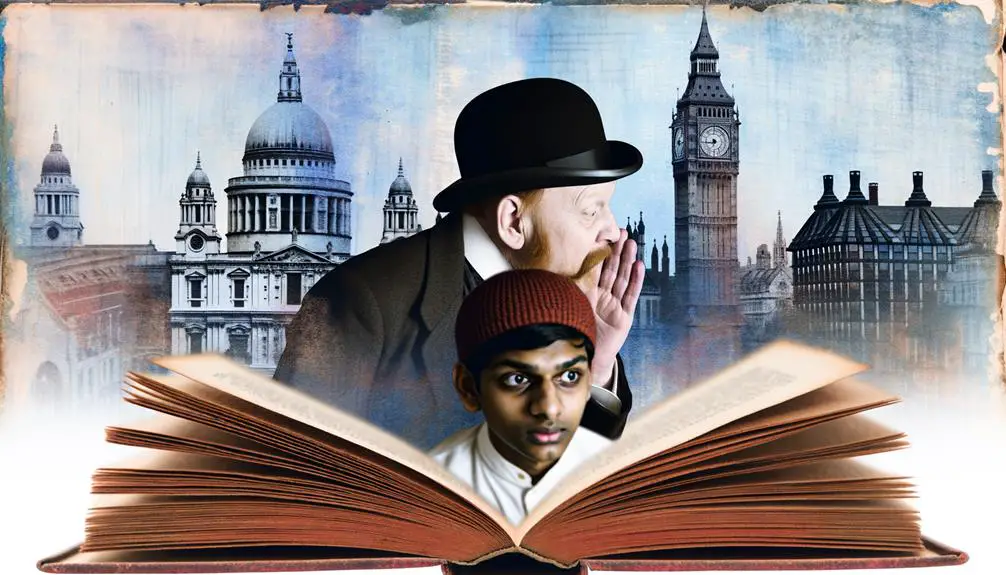
Tracing the etymology of 'nutter' reveals a complex tapestry of linguistic evolution and societal changes, shedding light on how this term evolved to encapsulate both eccentricity and endearment within British culture. Initially, the word 'nut' in Old English denoted the hard fruit of a tree, but as language and society morphed, so too did the meanings attached to this simple syllable. By the 20th century, 'nut' had adopted connotations of the head, and by extension, one's mind, laying the groundwork for 'nutter' to emerge as a descriptor for someone perceived as mentally imbalanced or behaving outside societal norms.
Your understanding of 'nutter' deepens when you consider the broader context of linguistic evolution and societal perceptions. The term reflects a period in British history where eccentricity began to be viewed with a mixture of bemusement and affection rather than fear or outright hostility. This shift is emblematic of broader societal changes towards mental health and individuality, where language plays a pivotal role in reflecting and shaping attitudes.
Moreover, the adaptability of 'nutter' within the lexicon underscores the fluid nature of language, shaped by social currents and historical events. It's a manifestation of the dynamic interplay between words and the world they describe, evolving to meet the changing needs and attitudes of society.
Analyzing 'nutter' through the lens of linguistic evolution and societal perceptions, you're not just looking at a word but a reflection reflecting the complexities and idiosyncrasies of British culture through the ages. It's a fascinating journey through language, revealing much about the values, attitudes, and humor that bind a culture together.
Variations Across the UK
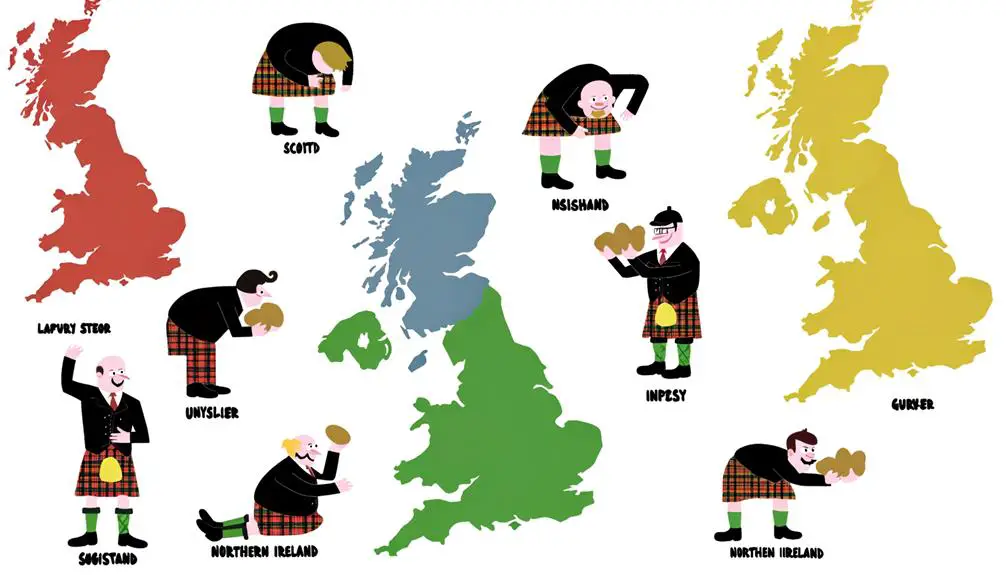
Exploring how 'nutter' is understood and used throughout the UK reveals a rich tapestry of regional dialects and cultural nuances, reflecting the diverse linguistic landscape of the region. This term, though uniformly recognized across the country, manifests in various forms and shades of meaning, driven by regional interpretations and dialect differences. To understand the full spectrum of its usage, you must investigate the specifics of how different UK regions interpret and employ this slang.
- In Northern England, particularly in cities like Manchester and Liverpool, 'nutter' often carries a somewhat affectionate tone when used among friends, signaling someone who's eccentric or behaves in a comically foolish way. It's a term of endearment rather than derision, showcasing the Northern knack for using playful language even in potentially negative contexts.
- Scotland's take on 'nutter' leans more towards describing someone with unpredictable or genuinely concerning behavior. The Scottish dialects add a layer of seriousness to the term, reflecting perhaps a more straightforward approach to labeling erratic behavior. Here, calling someone a 'nutter' is less about humor and more a comment on someone's mental state or unpredictability.
- In London and the South East, the term becomes more nuanced, often used to describe individuals who stand out for their unique, sometimes disruptive, contributions to culture or society. It's less about mental state and more about one's actions against societal norms.
These variations highlight the importance of context and regional dialects in understanding the full meaning and usage of 'nutter' across the UK. Each interpretation offers a window into how language evolves and adapts to different cultural and societal landscapes, underlining the rich diversity of British slang.
Cultural Significance
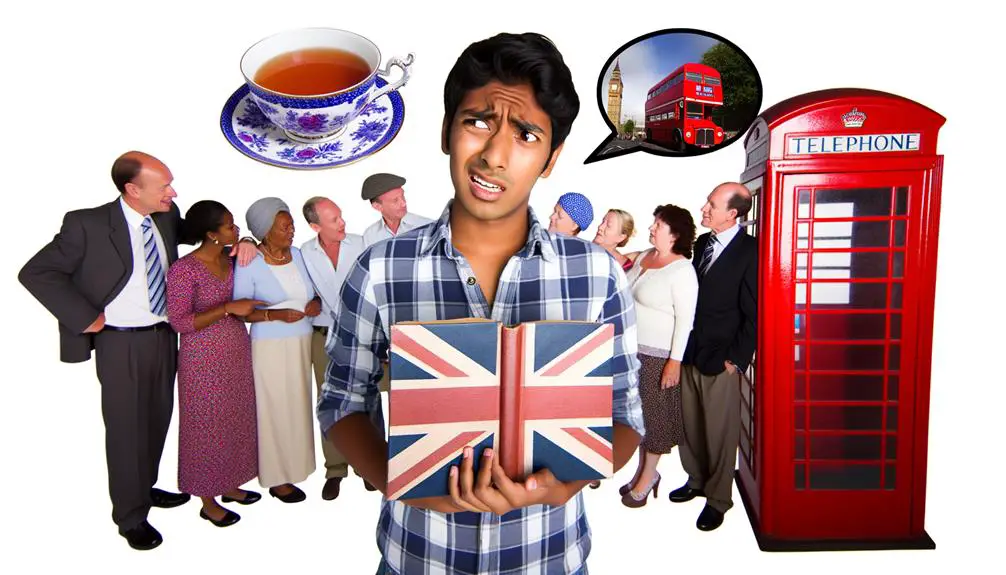
The term 'nutter' holds a mirror to the UK's complex cultural fabric, revealing how societal norms and values shape the language. This word, while seemingly casual or flippant, carries deep social implications, hinting at the British attitude towards mental health and eccentricity. Unlike some cultures that may valorize conformity, the UK has a nuanced view of individuality, where eccentric behavior can be both celebrated and critiqued.
In your exploration of 'nutter's cultural significance, you'll find that its application is a double-edged sword. On one hand, it can denote affection for someone's harmless quirks, underlining the British penchant for understatement and irony. On the other, it might subtly enforce social conformity by marking outlandish behavior as undesirable. This duality reflects the societal tension between individualism and collectivism, a balance that every culture negotiates differently.
Global comparisons further illuminate 'nutter's unique place in British English. For instance, American English lacks a direct equivalent that carries the same connotations, suggesting differences in how societies navigate mental health discourse and eccentricity. Similarly, in some cultures, language might more harshly stigmatize mental health issues, without the nuanced acceptance found in British contexts.
Understanding 'nutter' offers insight into the broader cultural landscape, demonstrating how language functions as a social barometer. It encapsulates the UK's complex relationship with nonconformity, blending humor, affection, and critique. As you explore further, you'll appreciate how such terms fashion the intricate mosaic of British cultural identity, illuminating the social undercurrents that shape communal life.
Examples in Media
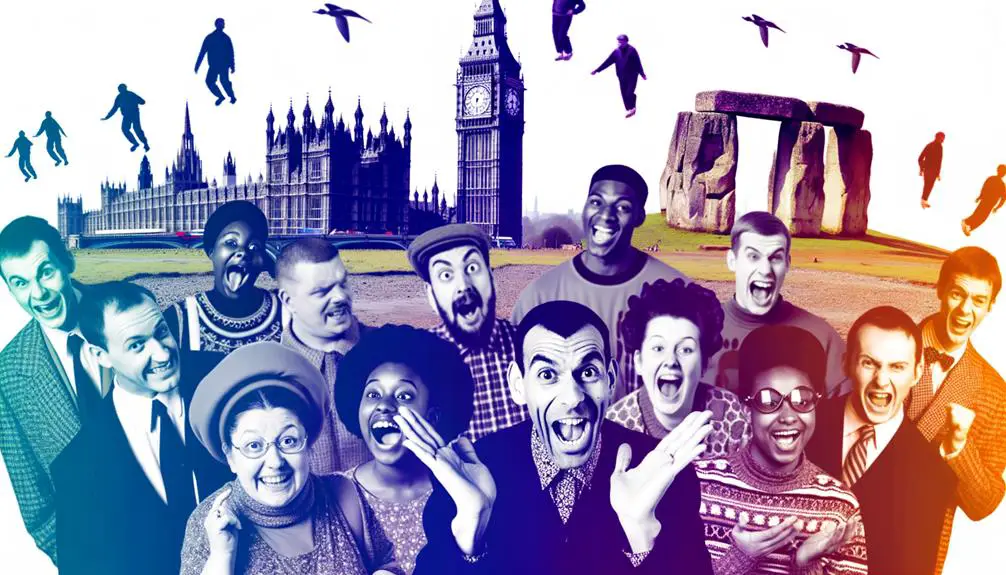
Moving beyond cultural implications, it's instructive to examine how 'nutter' manifests in media representations, offering a lens through which the term's societal resonance can be observed. The portrayal of characters labeled as 'nutters' in film and television often oscillates between comedic relief and the tragic outcast, a dualism that reflects the complex societal attitudes towards mental health and eccentricity. Through film analysis and celebrity quotes, we can dissect how media both perpetuates and challenges the stereotypes associated with this term.
- British Cinema: Consider the gritty landscapes of British cinema, where 'nutter' characters often embody the rebellion against societal norms. These portrayals, ranging from the comically exaggerated to the deeply flawed and vulnerable, serve as a critique of the social systems that label individuals as such. The character study within films like 'Trainspotting' or 'Snatch' offers a nuanced exploration of what it means to be a 'nutter' in a society that both celebrates and ostracizes non-conformity.
- Television Series: British television series, comedies, frequently utilize the 'nutter' archetype for humor while subtly commenting on the character's underlying issues. Shows like 'The IT Crowd' or 'Peep Show' present characters in absurd situations, using humor as a vehicle to explore deeper societal and psychological themes.
- Celebrity Quotes: When celebrities discuss their roles as 'nutters', they often touch upon the humanizing aspects of these characters, challenging the dismissive nature of the label. Their insights during interviews offer a reflective look at the complexities of mental health, eccentricity, and the consequences of societal labels.
In analyzing these representations, it's evident that the term 'nutter', while seemingly dismissive, opens avenues for a deeper understanding of societal attitudes towards eccentricity and mental health.
Frequently Asked Questions
How Does the Perception of the Term "Nutter" Differ Among Various Age Groups Within the Uk?
You'll find that the term's perception varies considerably across different age groups in the UK, reflecting nuances in generational vernacular and youth appropriation. Older generations might view it with a sterner, more negative connotation, associating it with genuine mental instability.
In contrast, younger people often use it more casually or humorously, diluting its harshness. This shift exemplifies the fluid nature of language and how societal attitudes towards mental health have evolved.
Are There Any Legal Implications or Restrictions Associated With Using the Term "Nutter" in Public or Media Within the Uk?
You're not out of the woods yet when it comes to using 'nutter' in public or media within the UK. Maneuvering the murky waters of legal terminology, it's crucial to ponder public decency laws. While there's no direct legal ban, using derogatory terms could potentially breach peace or incite offense, drawing legal scrutiny.
Analyzing this from an academic standpoint unveils a nuanced balance between free speech and maintaining public decency standards.
How Do Non-Native English Speakers or Foreigners Typically Respond or Understand the Term "Nutter" When They Encounter It in the Uk?
When you're a non-native English speaker encountering 'nutter' in the UK, you might experience cultural confusion. Understanding local slang involves more than just language adaptation; it requires immersing yourself in the nuances of British culture.
Initially, you might misinterpret or be puzzled by the term, as its colloquial use isn't straightforward. However, over time, through interactions and context, you'll grasp its meaning and how it reflects certain attitudes or behaviors within British society.
Has the Term "Nutter" Been Adopted or Adapted Into Any Other Languages, and if So, How Is It Used or Interpreted in Those Contexts?
You're exploring how language evolution and cultural nuances influence the adoption or adaptation of the term 'nutter' into other languages. This term's journey reflects a fascinating intersection of language and culture, showing how slang migrates and transforms.
In various contexts, 'nutter' can take on different shades of meaning, intricately tied to local expressions and attitudes. This adaptation process highlights the dynamic nature of language, shaped by cultural exchanges and societal shifts.
In What Ways Has the Use of the Term "Nutter" Been Challenged or Criticized by Mental Health Advocacy Groups Within the Uk?
You're exploring how mental health advocacy groups in the UK have challenged the use of 'nutter.' They argue it lacks cultural sensitivity and contributes negatively to the stigma surrounding mental health.
These groups have highlighted the importance of language evolution, advocating for more respectful terms.
Their efforts reflect a broader push towards understanding mental health issues without resorting to derogatory language, emphasizing the need for societal growth and the reevaluation of colloquial terms.
Conclusion
To wrap up, you've journeyed through the linguistic jungle to uncover the essence of 'nutter' in British slang. Originating from historical depths and varying across the UK, its significance in culture is as vast as the British Empire itself.
From cheeky banter to media portrayals, 'nutter' illustrates the quirky charm of British English. This exploration hasn't just added a word to your lexicon but has transported you to the heart of British cultural dynamics, where language reflects the colorful tapestry of life itself.






